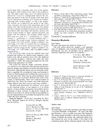 50 citations,
January 2014 in “PLOS ONE”
50 citations,
January 2014 in “PLOS ONE” Heavy ion radiation has a more severe and long-lasting effect on mouse intestinal metabolites than gamma radiation.
 December 2011 in “Ophthalmology”
December 2011 in “Ophthalmology” Demodex may be linked to blepharitis, and treatments like tea tree oil and ivermectin can help.
 April 2024 in “Journal of Investigative Dermatology”
April 2024 in “Journal of Investigative Dermatology” Using quantitative traits in genetics can improve understanding and management of skin health and conditions.
 3 citations,
March 2017 in “Case Reports in Dermatology”
3 citations,
March 2017 in “Case Reports in Dermatology” A woman with lupus improved significantly from scalp hair loss after treatment, highlighting the need to identify psoriatic alopecia in lupus patients to avoid permanent hair loss.
 42 citations,
July 2014 in “Journal of biological chemistry/The Journal of biological chemistry”
42 citations,
July 2014 in “Journal of biological chemistry/The Journal of biological chemistry” Heparan sulfate is important for hair growth, preventing new hair formation in mature skin, and controlling oil gland development.
 7 citations,
January 2014 in “Case reports in endocrinology”
7 citations,
January 2014 in “Case reports in endocrinology” A woman's excessive hair growth was caused by a rare benign tumor in her adrenal gland, which was successfully removed.
 788 citations,
February 2007 in “Nature”
788 citations,
February 2007 in “Nature” The document concludes that skin stem cells are important for hair growth and wound healing, and could be used in regenerative medicine.
 11 citations,
May 2010 in “Journal of Medicinal Chemistry”
11 citations,
May 2010 in “Journal of Medicinal Chemistry” A new compound was created in 2010 that can control oil production when applied to the skin, and its effects are completely reversible after two weeks.
 July 2018 in “Elsevier eBooks”
July 2018 in “Elsevier eBooks” Lichen Planopilaris is a hair loss condition best treated early with various medications, including hydroxychloroquine, to prevent permanent baldness.
44 citations,
January 2013 in “BMC Dermatology” TGFβ signaling prevents sebaceous gland cells from producing fats.
 14 citations,
December 2020 in “Journal of Investigative Dermatology”
14 citations,
December 2020 in “Journal of Investigative Dermatology” Aging causes changes in the scalp that can affect hair growth and lead to older-looking hair in women.
 22 citations,
January 2018 in “Experimental Dermatology”
22 citations,
January 2018 in “Experimental Dermatology” The meeting focused on understanding, diagnosing, and finding treatments for irreversible hair loss diseases.
 April 2017 in “Journal of Investigative Dermatology”
April 2017 in “Journal of Investigative Dermatology” Researchers improved a method to study individual cells in newborn mouse skin and found a way to assess the severity of a skin condition in humans.
 10 citations,
August 2014 in “Skin research and technology”
10 citations,
August 2014 in “Skin research and technology” Sleep, testosterone levels, and a specific enzyme activity affect skin oil production in women.
3 citations,
November 2021 in “IntechOpen eBooks” The testes produce important hormones like testosterone and others that play key roles in male body functions.
 July 2022 in “Skin research and technology”
July 2022 in “Skin research and technology” Skin CT can help diagnose rosacea by identifying specific skin features, but should be used with clinical signs to avoid misdiagnosis.
 11 citations,
June 2022 in “Frontiers in immunology”
11 citations,
June 2022 in “Frontiers in immunology” New protein changes may be involved in the immune attack on hair follicles in alopecia areata.
2 citations,
November 2022 in “Veterinary sciences” The interdigital gland of Vembur sheep shows sex-based differences in size and chemical makeup, possibly affecting communication and disease protection.
 6 citations,
January 2013
6 citations,
January 2013 Hyperadrenocorticism in ferrets is linked to neutering and indoor housing, and is best treated with surgery and a deslorelin implant.
8 citations,
January 2023 in “International journal of molecular sciences” Transglutaminase activity is important for skin and is found in both mammals and birds.
13 citations,
September 2022 in “Biomolecules” The research confirms that Hidradenitis Suppurativa is characterized by increased inflammation, disrupted skin cell organization, and abnormal metabolic processes.
41 citations,
July 2016 in “Radiation Research” Radiation damages salivary glands by harming blood vessels, but antioxidants might help protect them.
 40 citations,
July 2013 in “Skin Pharmacology and Physiology”
40 citations,
July 2013 in “Skin Pharmacology and Physiology” Male skin gets drier and more alkaline as it ages, which may need different skincare than women's skin.
 1 citations,
January 2023 in “Metabolites”
1 citations,
January 2023 in “Metabolites” Changes in gut bacteria can contribute to the development of Polycystic Ovary Syndrome (PCOS), affecting metabolism, immunity, and causing inflammation. Treatments may involve adjusting these factors.
 12 citations,
February 2006 in “Lipids”
12 citations,
February 2006 in “Lipids” Hair texture changes with age due to varying levels of lipids.
 9 citations,
January 2017 in “Elsevier eBooks”
9 citations,
January 2017 in “Elsevier eBooks” Skin's epithelial stem cells are crucial for repair and maintenance, and understanding them could improve treatments for skin problems.
39 citations,
April 2012 in “Journal of controlled release” New method uses hair follicles to deliver drugs deep into the skin.
 April 2016 in “The journal of investigative dermatology/Journal of investigative dermatology”
April 2016 in “The journal of investigative dermatology/Journal of investigative dermatology” Applying the anti-cancer drug Bortezomib to skin can promote hair growth and increase hair proteins through the GATA-3 factor.
 7 citations,
February 2021 in “Dermatologic Therapy”
7 citations,
February 2021 in “Dermatologic Therapy” Sebaceous glands are involved in various skin disorders, some treatable with medications like finasteride and minoxidil.
 1 citations,
December 2023 in “The journal of investigative dermatology/Journal of investigative dermatology”
1 citations,
December 2023 in “The journal of investigative dermatology/Journal of investigative dermatology” Keeping β-catenin levels high in mammary cells disrupts their development and branching.























